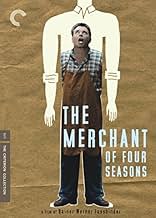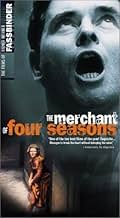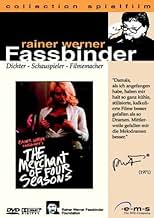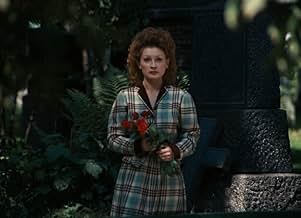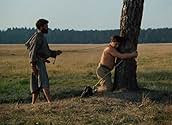NOTE IMDb
7,3/10
5,5 k
MA NOTE
Hans Epp est un personnage très sociable qui tente d'obtenir le respect de chacun. Malheureusement, son existence est parsemée de nombreux revers, notamment sentimentaux. Il tombe en dépress... Tout lireHans Epp est un personnage très sociable qui tente d'obtenir le respect de chacun. Malheureusement, son existence est parsemée de nombreux revers, notamment sentimentaux. Il tombe en dépression.Hans Epp est un personnage très sociable qui tente d'obtenir le respect de chacun. Malheureusement, son existence est parsemée de nombreux revers, notamment sentimentaux. Il tombe en dépression.
- Réalisation
- Scénario
- Casting principal
- Récompenses
- 3 victoires et 5 nominations au total
Walter Sedlmayr
- Fruit cart salesman
- (as Walther Sedlmayer)
El Hedi ben Salem
- The Arab
- (as Salem El Heïdi)
Avis à la une
In Fassbinder's earlier films, his ideas sometimes surpased his ability to execute them. He was always a great writer, but it took him some time to get his style of camera work and storytelling down pat.
The Merchant of Four Seasons is one of Fassbinder's first movie to make great use of color, from the bright green pears in the merchant's cart to the bright red roses at the funeral (a funeral in a Fassbinder movie? who'd have thought).
His camera work was getting there too, but it was still fairly minimalist. The occasional zooms seem a bit uncomfortable at times and unnatural, but then again, Fassbinder was still coming out of his purely avant garde phase. This might be because Michael Ballhaus isn't behind the camera, but instead the slightly inferior Dietrich Lohmann.
Still, this is Fassbinder, and you get your fix here. Broken dreams shown so vividly and unflinchingly as to alienate audience and drive them into a depressed stupor. Just what the doctor ordered. An early classic that shows remarkable progression when compared to his first films released only 2 years prior.
The Merchant of Four Seasons is one of Fassbinder's first movie to make great use of color, from the bright green pears in the merchant's cart to the bright red roses at the funeral (a funeral in a Fassbinder movie? who'd have thought).
His camera work was getting there too, but it was still fairly minimalist. The occasional zooms seem a bit uncomfortable at times and unnatural, but then again, Fassbinder was still coming out of his purely avant garde phase. This might be because Michael Ballhaus isn't behind the camera, but instead the slightly inferior Dietrich Lohmann.
Still, this is Fassbinder, and you get your fix here. Broken dreams shown so vividly and unflinchingly as to alienate audience and drive them into a depressed stupor. Just what the doctor ordered. An early classic that shows remarkable progression when compared to his first films released only 2 years prior.
About a man who lives life in a permanent crisis, don't we all these days - captured through portraits and pictures that could stand by themselves in any art gallery. A work of genius by a genius.
The Merchant of Four Seasons received all major W German film awards for 1971 but it took a couple of more years for Fassbinder to break through internationally. TM4S is a fairly simple story but it can be difficult or painful to watch due to the subject matter: class prejudices, domestic violence, infidelity, family discord, depression and self-destructive behavior. In other words it presents a bleak view of the world and its human inhabitants. I believe there's an undercurrent of cutting humor throughout although it's interesting that no examples spring to mind and it's not campy. I saw TM4S in the mid-70s and in 2015 didn't remember much at all (other than not liking it), which suggests I repressed a lot that first time. I now think it's the first of a few masterpieces by a director whose importance will certainly endure.
THE MERCHANT OF FOUR SEASONS was Rainer Werner Fassbinder's first shot at mainstream acceptance. In a turbulent career of just fifteen years, he managed to create an astounding body of work in film and theater, both as a performer and a creative producer, actor, and director. Although this movie might not appeal to many viewers, the film has much to offer. The storyline is fairly straightforward. A man is ostracized from his upper middle class family due to emotional and economic problems, and proves unable to control his downward spiral. THE MERCHANT OF FOUR SEASONS is shot with a slavish devotion to elegant detail, and each set is very carefully designed and constructed. Every object on set seems painstakingly arranged so as to provoke layers of emotional texture. Many religious paintings and icons decorate the walls of the various rooms and seem to speak to Hans's desperate quest for spiritual meaning or direction in his life. Much thought was given to how lighting and color were employed to contrast and enhance the drama. Several times during the film, I froze the frame to marvel at the beauty of the shot's composition. I streamed this film, and the print was nearly flawless and second to none. Fassbinder employs his actors in an almost vehement "Anti-Natural' style. He does everything possible to prevent the actors from reacting in a normal or colloquial manner, and this creates a rather stilted effect. However, by doing so, he injects an almost 'hyper-reality' to the narrative. Rather than the presentation of a mundane melodrama, the actors almost militant lack of affectation forces the viewer to confront the film in a different manner. Fassbinder's film intentionally prevents the viewer from easily connecting with the characters' trials and tribulations. You are constantly on the outside, looking in. This will be a disconcerting experience for many, but I found it to be a unique and satisfying artistic adventure.
If I squint, I can see the influence of Douglas Sirk on this Rainer Werner Fassbinder soaper about fruitseller Hans Hirschmüller. He's cast as a failure, because he doesn't live up to the middle-class aspirations of his family. He runs away and joins the Foreign Legion. He returns and joins the police, but is kicked out for consorting with a prostitute. His one true love can't marry him because of his work, although she meets him for assignations. In between, he has a shrewish wife in Irm Hermann, in-laws who despise him, a heart attack, and his gradual erasure from his own life to contend with.
However, while Sirk's most famous work in the 1950s tinges his disapproval of the post-war middle class with sympathy and wonderment at peoples' refusal to admit what they want to to be happy, Fassbinder seems angry and contemptuous of his subjects. Hirschmüller is too passive, Miss Miss Hermann plays the victim card too aggressively, his family arrant, mealy-mouthed snobs, and so forth. There's no one to root for in this. There's nothing tragic about his inevitable destruction, only a sadistic, scolding examination of all that Fassbinder finds wrong with mainstream society.
However, while Sirk's most famous work in the 1950s tinges his disapproval of the post-war middle class with sympathy and wonderment at peoples' refusal to admit what they want to to be happy, Fassbinder seems angry and contemptuous of his subjects. Hirschmüller is too passive, Miss Miss Hermann plays the victim card too aggressively, his family arrant, mealy-mouthed snobs, and so forth. There's no one to root for in this. There's nothing tragic about his inevitable destruction, only a sadistic, scolding examination of all that Fassbinder finds wrong with mainstream society.
Le saviez-vous
- AnecdotesAndrea Schober's debut.
- ConnexionsFeatured in Sehnsucht nach Sodom (1989)
Meilleurs choix
Connectez-vous pour évaluer et suivre la liste de favoris afin de recevoir des recommandations personnalisées
- How long is The Merchant of Four Seasons?Alimenté par Alexa
Détails
Box-office
- Budget
- 325 000 DEM (estimé)
- Montant brut aux États-Unis et au Canada
- 8 144 $US
- Week-end de sortie aux États-Unis et au Canada
- 11 623 $US
- 16 févr. 2003
- Montant brut mondial
- 8 158 $US
Contribuer à cette page
Suggérer une modification ou ajouter du contenu manquant

Lacune principale
By what name was Le marchand des quatre saisons (1972) officially released in India in English?
Répondre


